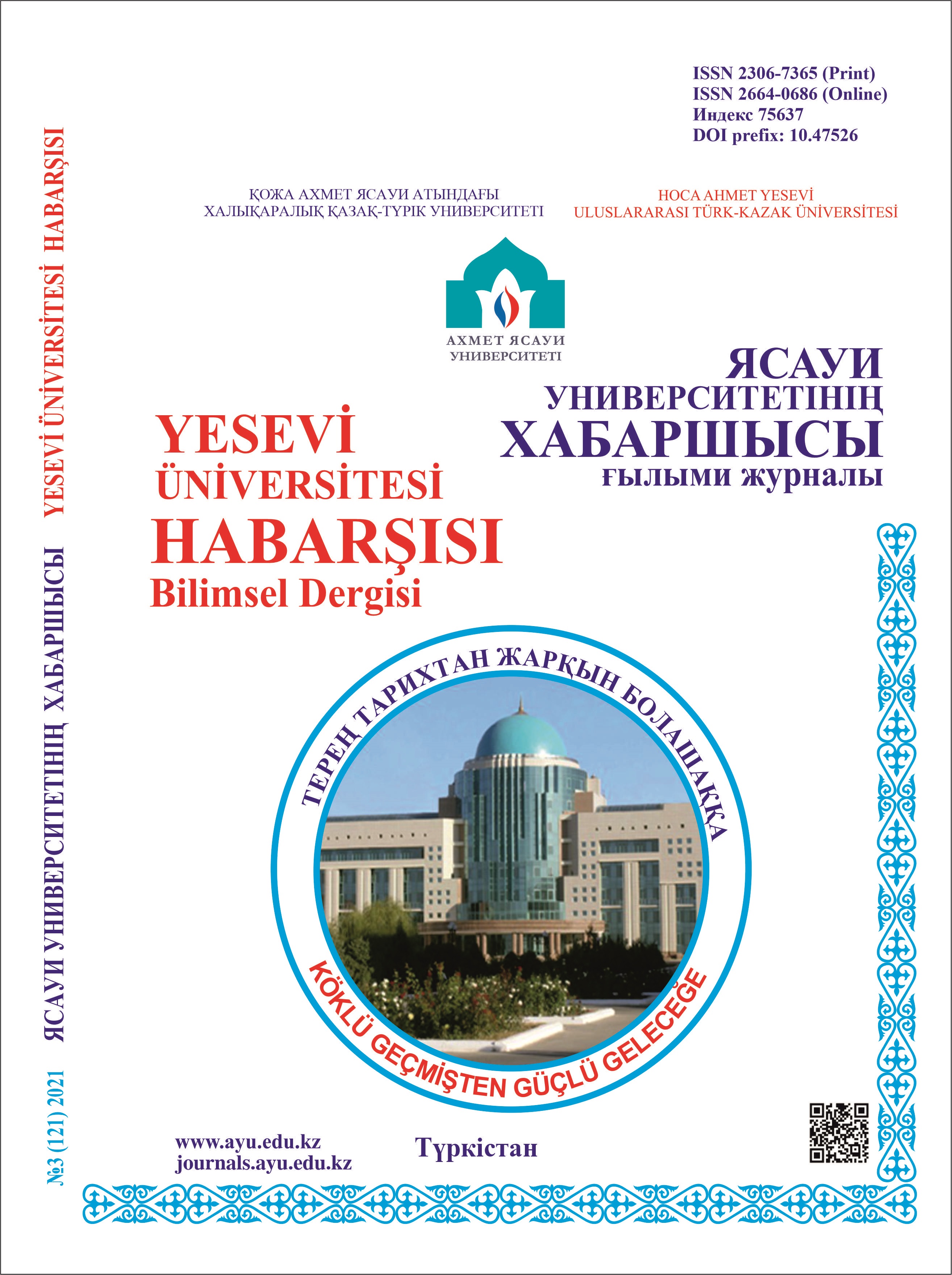Kazakistan'daki Okullarda Üç Dilliliğin Geliştirilmesinin Bir Araci Olarak Atasözleri Ve Atasözleri
357 262
Anahtar Kelimeler:
proverb, saying, folk art, language policy, trilingualism, skill development, communicative competence, educational process, secondary school.Özet
The article is devoted to the usage of proverbs and sayings in the process of
teaching English with the aim to develop trilingualism in secondary schools. The relevance of the research is determined by the fact that one of the important sources of introducing a figurative and expressive foreign speech to schoolchildren is the fund of phraseological units. The phraseological
fund of the language seems to be one of the most interesting and productive objects, vividly and distinctively showing national and cultural traditions, values and peculiarities of perception of the world, as well as the fact that the role of intercultural communication in the modern world is rapidly increasing. Proverbs are rich original material that, on the one hand, does not require adaptation, and on the other meets the highest artistic requirements. Thus, proverbs are the most fertile material.
The main thing is an affordable tool, and its role in teaching a foreign language can hardly be overestimated. Proverbs and sayings contribute to the memorization of various consonants, rhymes and rhythms.The authors believe that the use of proverbs and sayings in foreign language lessons
helps to solve both didactic and educational tasks: development of communication skills, memory; development of artistic thinking; getting acquainted with the history and culture of own community
and a foreign one; education of moral and spiritual qualities of an individual. The article also presents exercises with proverbs and sayings for improving a foreign language communicative competence of schoolchildren. The results of the research can be used in the educational process when teaching English at school and other educational organizations, and while compiling teaching aids, textbooks intended for teaching English.
Referanslar
Коменский Я.А. Великая дидактика. – М.: Государственное учебно-педагогическое издание, 1939. – 309 с.
Барабанский Ю.К. Оптимизация учебно-воспитательного процесса. – М.: Высшее образование, 1982. – 347 с.
Cooper T.C. Processing of idioms by L2 learners of English // TESOL Quarterly. – 1999. – №33, (2). P. 233–2627.
Prodromou L. The idiomatic paradox and English as a lingua franca: Developing an idiomatic common core // Modern English Teacher7 – 2003. No.12. P. 22–29.
Liontas J.I. Context and idiom understanding in second languages // EUROSLA Yearbook. – 2002. No.2. – P. 155–185.
Амбражейчик А. 2000 русских слов и 2000 английских идиом, фразеологизмов и устойчивых словосочетаний. – Мн.: Попурри, 2003. – 304 с.
Телия В.Н. Русская фразеология. – М.: Высшая школа, 2014. – 322 с.
Шанский Н.М. Фразеология современного русского языка. – СПб.: Специальная литература, 1996. – 192 с.
Виноградов В.В. Об основных типах фразеологических единиц в русском языке. – М.: Просвещение, 1977. – 542 с.
Скалкин В.Л. Коммуникативные упражнения на английском языке: учебное пособие. – Москва: Просвещение, 1983. – 128 с.
Ахманова О.С. Словарь лингвистических терминов. – М.: Сов. энцикл., 1969. – 571 с.
Зимняя И.А. Психология обучения иностранным языкам. – М.: Академия, 1997. – 159 с.
Ушинский К.Д. Собрание сочинений. Т.2. – М.: Издательство АПН РСФСР, 1948. – 696 с. 14. Tomalin B., Stepleski S. Cultural Awareness. – Oxford. Oxford University Press, 1996.
Франк В. Орысша-қазақша-ағылшынша пәндік-тақырыптық сөздік. – Алматы: Болашақ балапандары, 2000. – 288 б.
Валгина Н.С. Современный русский язык. – СПб.: Наука, 2003. – 416 с.
Cambridge International Dictionary of Idioms. URL: http://dictionary.cambridge.org/ru/
Book of English Idioms, with Explanations. [Электронный ресурс]. URL: http://examples.yourdictionary.com/idiom.html
Dictionary of English Colloquial Idioms [Electronic resource]. URL: https://www.usingenglish.com/reference/idioms/
Vaulina E. and etc. Spotlight. Student’s Book / English in Focus/ - M.: Просвещение, 2010. – 166 c.
REFERENCES
Komenskii Ia.A. Velikaia didaktika [Great Didactics]. – M.: Gosudarstvennoe uchebno-pedagogicheskoe izdanie, 1939. – 309 s. [in Russian]
Barabanskii Iu.K. Optimizaciia uchebno-vospitatelnogo processa [Optimization of the educational process]. – M.: Vysshee obrazovanie, 1982. – 347 s. [in Russian]
Cooper T.C. Processing of idioms by L2 learners of English // TESOL Quarterly. – 1999. – №33, (2). – P. 233–2627.
Prodromou L. The idiomatic paradox and English as a lingua franca: Developing an idiomatic common core // Modern English Teacher7 – 2003. No.12. P. 22–29.
Liontas J.I. Context and idiom understanding in second languages // EUROSLA Yearbook. – 2002. No.2. – P. 155–185.
Ambrazhejchik A. 2000 russkih slov i 2000 angliiskih idiom, frazeologizmov i ustoichivyh slovosochetanii [2000 Russian words and 2000 English idioms, phraseological units and stable phrases]. – Mn.: Popurri, 2003. – 304 s. [in Russian]
Teliia V.N. Russkaia frazeologiia [Russian phraseology]. – M.: Vysshaia shkola, 2014. – 322 s. [in Russian]
Shanskii N.M. Frazeologiia sovremennogo russkogo iazyka [Phraseology of the modern Russian language]. – SPb.: Specialnaia literatura, 1996. – 192 s. [in Russian]
Vinogradov V.V. Ob osnovnyh tipah frazeologicheskih edinic v russkom iazyke [On the main types of phraseological units in the Russian language]. – M.: Prosveshhenie, 1977. – 542 s. [in Russian]
Skalkin V.L. Kommunikativnye uprazhneniia na angliiskom iazyke: uchebnoe posobie [Communicative exercises in English: a textbook]. – Moskva: Prosveshenie, 1983. – 128 s. [in Russian]
Ahmanova O.S. Slovar lingvisticheskih terminov [Dictionary of linguistic terms]. – M.: Sov. encikl., 1969. – 571 s. [in Russian]
Zimniaia I.A. Psihologiia obucheniia inostrannym iazykam [Dictionary of linguistic terms]. – M.: Akademiia, 1997. – 159 s. [in Russian]
Ushinskii K.D. Sobranie sochinenii [Collected Works]. T.2. – M.: Izdatelstvo APN RSFSR, 1948. – 696 s. [in Russian]
Tomalin B., Stepleski S. Cultural Awareness. – Oxford. Oxford University Press, 1996.
Frank V. Oryssha-qazaqsha-agylshynsha pandіk-taqyryptyq sozdіk [Russian-Kazakh-English subject-subject dictionary]. – Almaty: Bolashaq balapandary, 2000. – 288 b. [in Kazakh]
Valgina N.S. Sovremennyi russkii iazyk [Modern Russian]. – SPb.: Nauka, 2003. – 416 s. [in Russian]
Cambridge International Dictionary of Idioms. URL: http://dictionary.cambridge.org/ru/
Book of English Idioms, with Explanations. [Jelektronnyj resurs]. URL: http://examples.yourdictionary.com/idiom.html
Dictionary of English Colloquial Idioms [Electronic resource]. URL: https://www.usingenglish.com/reference/idioms/
Vaulina E. and etc. Spotlight. Student’s Book / English in Focus/ - M.: Prosveshhenie, 2010. – 166 c.

